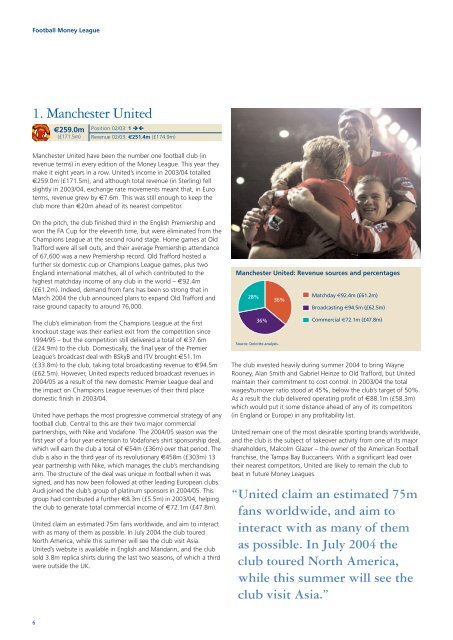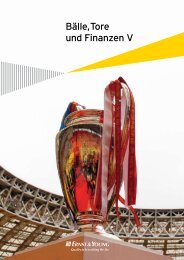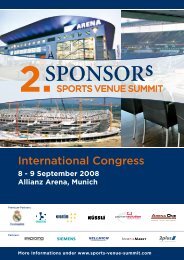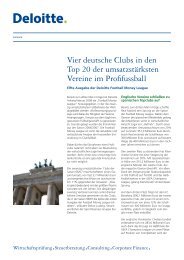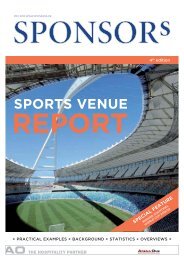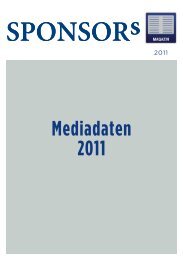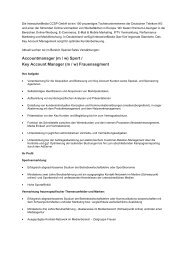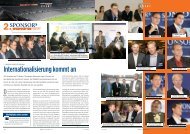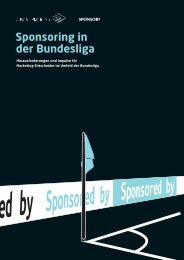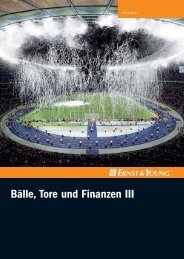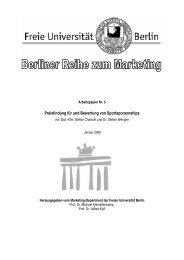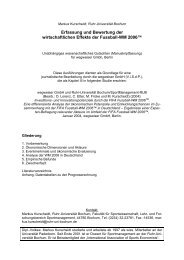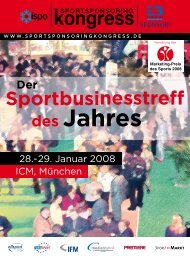Create successful ePaper yourself
Turn your PDF publications into a flip-book with our unique Google optimized e-Paper software.
<strong>Football</strong> <strong>Money</strong> <strong>League</strong><br />
1. Manchester United<br />
Manchester United have been the number one football club (in<br />
revenue terms) in every edition of the <strong>Money</strong> <strong>League</strong>. This year they<br />
make it eight years in a row. United’s income in 2003/04 totalled<br />
€259.0m (£171.5m), and although total revenue (in Sterling) fell<br />
slightly in 2003/04, exchange rate movements meant that, in Euro<br />
terms, revenue grew by €7.6m. This was still enough to keep the<br />
club more than €20m ahead of its nearest competitor.<br />
On the pitch, the club finished third in the English Premiership and<br />
won the FA Cup for the eleventh time, but were eliminated from the<br />
Champions <strong>League</strong> at the second round stage. Home games at Old<br />
Trafford were all sell outs, and their average Premiership attendance<br />
of 67,600 was a new Premiership record. Old Trafford hosted a<br />
further six domestic cup or Champions <strong>League</strong> games, plus two<br />
England international matches, all of which contributed to the<br />
highest matchday income of any club in the world – €92.4m<br />
(£61.2m). Indeed, demand from fans has been so strong that in<br />
March 2004 the club announced plans to expand Old Trafford and<br />
raise ground capacity to around 76,000.<br />
The club’s elimination from the Champions <strong>League</strong> at the first<br />
knockout stage was their earliest exit from the competition since<br />
1994/95 – but the competition still delivered a total of €37.6m<br />
(£24.9m) to the club. Domestically, the final year of the Premier<br />
<strong>League</strong>’s broadcast deal with BSkyB and ITV brought €51.1m<br />
(£33.8m) to the club, taking total broadcasting revenue to €94.5m<br />
(£62.5m). However, United expects reduced broadcast revenues in<br />
2004/05 as a result of the new domestic Premier <strong>League</strong> deal and<br />
the impact on Champions <strong>League</strong> revenues of their third place<br />
domestic finish in 2003/04.<br />
United have perhaps the most progressive commercial strategy of any<br />
football club. Central to this are their two major commercial<br />
partnerships, with Nike and Vodafone. The 2004/05 season was the<br />
first year of a four year extension to Vodafone’s shirt sponsorship deal,<br />
which will earn the club a total of €54m (£36m) over that period. The<br />
club is also in the third year of its revolutionary €458m (£303m) 13<br />
year partnership with Nike, which manages the club’s merchandising<br />
arm. The structure of the deal was unique in football when it was<br />
signed, and has now been followed at other leading European clubs.<br />
Audi joined the club’s group of platinum sponsors in 2004/05. This<br />
group had contributed a further €8.3m (£5.5m) in 2003/04, helping<br />
the club to generate total commercial income of €72.1m (£47.8m).<br />
United claim an estimated 75m fans worldwide, and aim to interact<br />
with as many of them as possible. In July 2004 the club toured<br />
North America, while this summer will see the club visit Asia.<br />
United’s website is available in English and Mandarin, and the club<br />
sold 3.8m replica shirts during the last two seasons, of which a third<br />
were outside the UK.<br />
6<br />
€259.0m<br />
(£171.5m)<br />
Position 02/03: 1 ��<br />
Revenue 02/03: €251.4m (£174.9m)<br />
Manchester United: Revenue sources and percentages<br />
28%<br />
36%<br />
Source: Deloitte analysis.<br />
36%<br />
Matchday €92.4m (£61.2m)<br />
Broadcasting €94.5m (£62.5m)<br />
Commercial €72.1m (£47.8m)<br />
The club invested heavily during summer 2004 to bring Wayne<br />
Rooney, Alan Smith and Gabriel Heinze to Old Trafford, but United<br />
maintain their commitment to cost control. In 2003/04 the total<br />
wages/turnover ratio stood at 45%, below the club’s target of 50%.<br />
As a result the club delivered operating profit of €88.1m (£58.3m)<br />
which would put it some distance ahead of any of its competitors<br />
(in England or Europe) in any profitability list.<br />
United remain one of the most desirable sporting brands worldwide,<br />
and the club is the subject of takeover activity from one of its major<br />
shareholders, Malcolm Glazer – the owner of the American <strong>Football</strong><br />
franchise, the Tampa Bay Buccaneers. With a significant lead over<br />
their nearest competitors, United are likely to remain the club to<br />
beat in future <strong>Money</strong> <strong>League</strong>s.<br />
“United claim an estimated 75m<br />
fans worldwide, and aim to<br />
interact with as many of them<br />
as possible. In July 2004 the<br />
club toured North America,<br />
while this summer will see the<br />
club visit Asia.”


